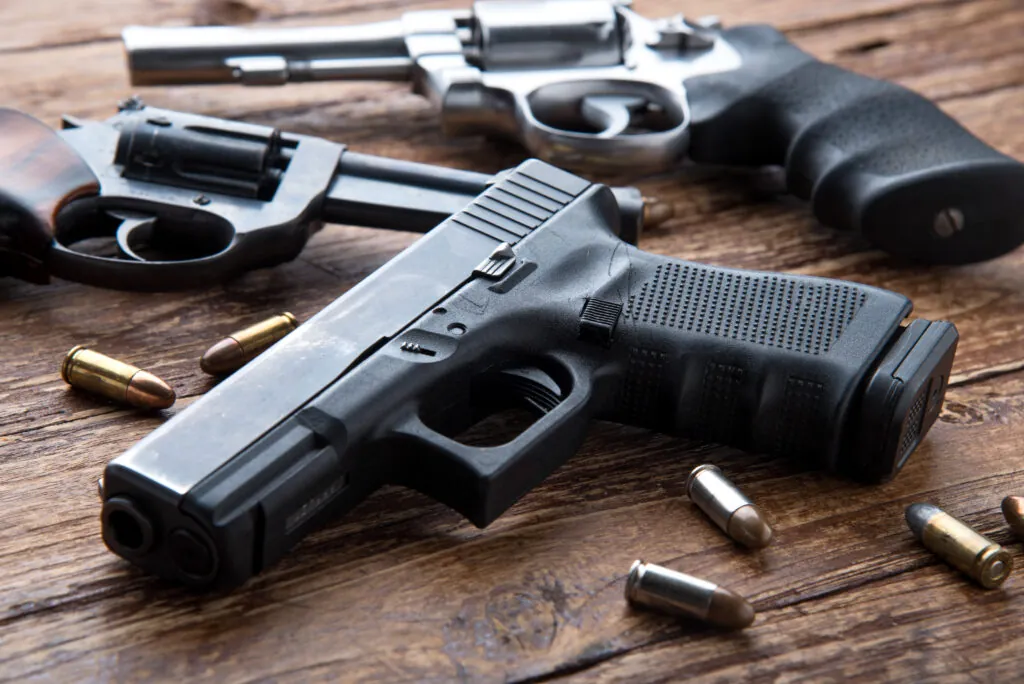Navigating the world of firearms can be a complex endeavor. This is especially true when it comes to understanding the legal requirements for transferring firearms.
Whether you’re a seasoned firearms enthusiast, a novice shooter, or a history teacher seeking accurate information, this guide is for you. It aims to demystify the legal aspects of transferring firearms, providing a comprehensive understanding of the process.
Perhaps you’re considering selling a gun. Maybe you’re exploring online platforms like Luxus Capital for your transaction. Or, you might be engaging in a private sale. Regardless of the scenario, understanding the legalities is crucial.
This guide will delve into the federal and state-specific regulations governing firearm transfers. It will explain the role of agencies like the Bureau of Alcohol, Tobacco, Firearms and Explosives (ATF) and systems like the National Instant Criminal Background Check System (NICS).
We’ll also explore the process of selling a firearm, both privately and through a Federal Firearms Licensee (FFL). We’ll discuss the importance of record-keeping and the potential penalties for non-compliance.
By the end of this guide, you’ll have a solid understanding of the legal requirements for transferring firearms. This knowledge will empower you to make informed decisions, ensuring your transactions are both legal and safe.
Understanding Federal Firearm Transfer Laws
Federal laws form the backbone of firearm transfer regulations in the United States. These laws aim to control and facilitate safe transfers between parties, mitigating illegal sales.
Central to these regulations is the mandate that firearm transfers adhere to established legal procedures. This includes engaging with authorized entities and conducting requisite background checks.
The federal landscape of gun laws encompasses transfers carried out by licensed dealers and those occurring between private individuals. Both scenarios are covered under rigorous statutes.
To ensure compliance, both sellers and buyers must understand their obligations under these federal laws. Ignorance of the law is not a defense against violations and potential penalties.
In practical terms, this means knowing when a transfer requires intervention from a Federal Firearms Licensee (FFL). It also includes understanding state-level nuances that might affect the transfer process.
Navigating these regulations confidently is essential. Staying informed and diligent helps promote both personal responsibility and broader public safety in firearm transactions.
The Gun Control Act of 1968 and Its Impact
The Gun Control Act of 1968 is pivotal in shaping U.S. firearm laws. This act was instituted to regulate firearms commerce and ownership.
It requires that all firearm sales between federal jurisdictions occur through licensed dealers, an essential safeguard against illegal sales. The Act also introduced restrictions on firearms transfers to certain categories of individuals deemed ineligible to own firearms.
These restrictions help prevent convicted felons, minors, and other prohibited persons from legally acquiring firearms. By specifying these criteria, the Gun Control Act of 1968 reinforced a crucial layer of regulatory oversight in the sale and distribution of firearms.
The Role of the ATF in Firearm Transfers
The Bureau of Alcohol, Tobacco, Firearms and Explosives (ATF) plays a central role in regulating firearm transfers. The ATF enforces federal laws and oversees licensure of firearm dealers.
Its duties also extend to providing guidance on legal compliance for both individuals and businesses engaging in firearm transactions. Through these efforts, the ATF works to prevent illegal transfers and ensure that all transactions adhere to legal standards.
Furthermore, the ATF conducts regular audits and inspections of firearm dealers. These actions are essential to ensure compliance and to identify potential violations.
Background Checks and the NICS System
Background checks are a critical step in the firearm transfer process. They are conducted through the National Instant Criminal Background Check System (NICS), overseen by the FBI.
NICS checks quickly assess the eligibility of a potential buyer. This system helps prevent the transfer of firearms to those prohibited under law, such as felons or individuals with restraining orders.
The process is generally efficient and often completed in minutes. However, if the results are inconclusive, the system allows for a three-day waiting period before a firearm can be released.
The implementation of background checks is a cornerstone of federal efforts to ensure safe, legal firearm transfers. It promotes responsible gun ownership while aiming to protect the public from potential harm.
Overall, the NICS system highlights the importance of technology in regulatory compliance for firearms transactions. It underscores the commitment to balancing the rights of individuals with broader safety concerns.
State-Specific Firearm Transfer Regulations
In the U.S., state laws add another layer of complexity to firearm transfers. While federal regulations provide the foundation, state-specific rules often dictate additional procedures or restrictions. This dual framework can vary significantly across state lines, influencing how transfers are conducted locally.
Some states have mandated that all firearm sales, including private transactions, be processed through a Federal Firearms Licensee (FFL). This ensures that a background check is performed on the buyer, regardless of the transfer’s setting. It’s crucial for both buyers and sellers to understand these requirements to avoid legal pitfalls.
Beyond general sales, certain states impose specific regulations on the transfer of particular types of firearms, like handguns or assault weapons. These laws can include registration requirements or restrictions based on firearm type, which prospective sellers and buyers need to be aware of.
Additionally, states might enforce waiting periods, during which a buyer must wait before completing the transfer. This period is intended to provide a buffer for thorough background checks and to help prevent impulsive acts.
Understanding the specific laws of your state is essential. It’s advisable to consult local regulations or seek legal expertise to ensure compliance with all required procedures when transferring firearms within your state.
Understanding Private Sales vs. FFL Transactions
Private firearm sales allow individuals to transfer firearms without involving an FFL in certain states. This process can be straightforward, but it varies depending on local laws, as some states require all transfers to occur through an FFL to ensure background checks are performed.
In contrast, transactions through an FFL involve additional layers of accountability and legal compliance. When conducting a sale through an FFL, both parties must adhere to federal standards, and the licensed dealer facilitates the background check process, ensuring the legitimacy of the transaction.
Choosing between private sale and FFL transaction depends on state regulations and personal preference for regulatory oversight. Each option comes with its obligations, underscoring the importance of understanding both federal and state laws governing these transactions.
Interstate Firearm Sales: Legal Considerations
Conducting firearm sales across state lines introduces additional legal complexities. Federal law mandates that any interstate firearm transfer involving a licensed dealer, which underscores the importance of navigating these transactions carefully to remain compliant.
For handguns, all interstate transactions must be carried out through an FFL in the buyer’s state of residence. This means the firearm must be shipped to an FFL where the buyer will complete the transfer after passing the background check.
Long guns have more flexibility, allowing transfer in either the buyer’s or seller’s state through an FFL. Yet, it’s crucial to adhere to the laws of both states involved. Failing to understand or comply with these legal nuances can result in severe penalties, thus making legal guidance or consulting with knowledgeable resources advisable.
The Process of Legally Selling a Firearm
Selling a firearm legally involves several critical steps to ensure compliance with both federal and state laws. Understanding these steps helps avoid potential legal repercussions and ensures a smooth transaction. Whether selling to a private party or through a dealer, knowing the proper procedures is key.
The first step in any firearm sale is verifying the legality of the prospective buyer’s eligibility to own a gun. This typically involves conducting a background check. In most cases, this process is facilitated by an FFL, which ensures the buyer is not prohibited from owning firearms.
If you opt for a private sale, it’s important to check your state’s laws regarding such transactions. Some states require private sales to go through an FFL, ensuring a background check is still conducted. Familiarizing yourself with local regulations is essential to executing a legal transfer.
Once the sale is agreed upon, and eligibility is confirmed, proper documentation is necessary. This includes creating a bill of sale, which should detail the firearm’s specifics, sale date, and the identities of both parties. This document serves as a valuable record in case questions arise later.
Finally, ensuring safe transfer of the firearm is critical. This might involve shipping the firearm to the receiving FFL for out-of-state transactions or arranging a secure hand-off. Regardless of the method, prioritizing safety and legality throughout the entire process is crucial for all involved.
Step-by-Step Guide to Transferring Through an FFL
Transferring a firearm through a Federal Firearms Licensee provides added security and assurance of compliance with the law. To initiate this process, locate an FFL in your area. The FFL will facilitate the transaction by guiding both parties through necessary legal steps.
Upon arriving at the FFL, the seller will present the firearm and any pertinent documentation. This information includes the firearm’s make, model, and serial number. Accurate and complete documentation ensures that the firearm’s background is clear.
Next, the buyer must complete the ATF Form 4473. This form gathers information about the buyer, confirming their legal eligibility to purchase firearms. This step is crucial in preventing illegal transfers and ensuring compliance with federal regulations.
The FFL will then conduct a background check through the National Instant Criminal Background Check System (NICS). Once the buyer clears this check, the transfer can proceed. This process ensures that the sale is conducted safely and legally, shielding both parties from potential legal issues.
Online Platforms and Legal Sales: Using Luxus Capital as an Example
Online platforms have revolutionized how firearms can be legally sold. Luxus Capital, for example, offers a modern, convenient option for sellers looking to connect with potential buyers. Utilizing such platforms can streamline the transfer process, provided they are used in compliance with laws.
When selling a gun online, it’s critical to remember that federal laws apply just as they do in physical transactions. Luxus Capital enables sellers to list their firearms while maintaining legal oversight, ensuring background checks are conducted through an FFL.
By utilizing online platforms like Luxus Capital, sellers can reach a broader audience while adhering to strict legal standards. This online marketplace supports the legal sale of firearms, ensuring that transactions remain both lawful and convenient for all parties involved.
Record-Keeping and the Importance of Bills of Sale
Keeping thorough records is a vital component of legally transferring firearms. A bill of sale is an important document that outlines the details of the transaction, including the firearm’s specifications, sale date, and the involved parties’ identities.
This documentation serves multiple purposes. Primarily, it provides legal proof of the transaction, protecting both buyer and seller from potential disputes. It also establishes a clear chain of ownership, which can be particularly beneficial if questions arise regarding the firearm’s history.
Maintaining accurate records is not only a best practice but, in some states, a legal requirement. These records ensure transparency and accountability, contributing to responsible gun ownership. Sellers should securely store these documents to reference if needed in the future.
In the event of legal inquiries or audits, bills of sale and other records provide a solid foundation of evidence. Proper record-keeping demonstrates compliance with all applicable laws, reinforcing the legitimacy and legality of the firearm transfer.
Penalties and Legal Consequences of Non-Compliance
Failing to comply with legal requirements for firearm transfers can lead to serious consequences. Both federal and state laws impose strict penalties for unlawful transfers. These can include hefty fines, imprisonment, or both, depending on the severity of the violation.
For the seller, negligence in performing required background checks or disregarding state-specific regulations can result in legal action. Ignorance of the law is not a defense. Courts hold sellers accountable for ensuring all transactions meet legal standards. Ensuring compliance safeguards against these costly repercussions.
Buyers also face consequences if they engage in illegal purchases. Being found with a firearm obtained through an unlawful transfer can lead to criminal charges. Additionally, transferring a firearm to a prohibited person can have severe implications for both parties. Hence, understanding and following legal obligations is essential for all involved in the transfer process.
Special Cases in Firearm Transfers
Firearm transfers can become complex when special circumstances arise. Gifting, inheritance, and collectibles introduce unique legal challenges. It’s crucial to understand how these cases differ from standard sales.
When transferring firearms as gifts, specific regulations apply. While federal law has fewer restrictions for gifts, state laws vary. Some states require background checks for all transfers, including gifts.
Inheritance also presents its own legal nuances. The transfer of firearms through a will or estate can be straightforward in some states. However, others may have registration or notification requirements.
Firearm transactions involving National Firearms Act (NFA) items demand careful attention. These items, like suppressors and machine guns, are heavily regulated. Their transfer involves additional paperwork, taxes, and waiting periods. Thus, understanding the precise laws is essential in these special cases.
Gifting, Inheritance, and NFA Items
Gifting a firearm might seem simple, but legality hinges on compliance with state laws. Federally, a gift is permissible if both parties are allowed to possess firearms. Always verify state-specific gifting regulations to avoid legal pitfalls.
Inheritances can surprise heirs with complex legal requirements. Some states require registration, even if the deceased lawfully owned the firearm. It’s wise to consult legal experts to navigate estate firearm transfers smoothly.
NFA items are a category that invites legal scrutiny. The transfer of these items includes unique hurdles such as ATF approval, payment of tax, and potential delays. Ensure all necessary steps are followed for a lawful transfer of these heavily-regulated firearms.
Antique Firearms and Collectibles
Antique firearms often escape modern legal constraints. Typically, guns manufactured prior to 1899 are exempt from the usual regulations. However, confirming the firearm’s historical status is vital before transferring it.
Collectible firearms might not be subject to rigorous federal regulation. Still, state laws may impose additional oversight. Collectors should familiarize themselves with local rules to avoid unintentional legal violations.
Transferring collectible firearms warrants careful documentation. Keeping detailed records safeguards against future disputes and aids in maintaining the firearm’s provenance. Treat these items with the care they deserve while adhering to applicable laws.
The Historical Context of Firearm Transfer Laws
Understanding firearm transfer laws requires knowledge of their historical foundation. Historically, regulations have evolved to address changing societal needs and safety concerns. These laws reflect a complex interplay between individual rights and public safety.
In the early 20th century, the rise of organized crime spurred calls for stricter laws. The National Firearms Act of 1934 was among the first to regulate specific firearm types. This legislation set a precedent for future regulations by introducing taxes and registration requirements for certain firearms.
The Gun Control Act of 1968 marked another significant shift. It was enacted following public outcry over high-profile assassinations. By regulating interstate transfers, it aimed to prevent firearms from falling into the wrong hands, emphasizing a balance between rights and responsibilities.
Today’s firearm transfer laws are deeply rooted in these historical developments. This context helps us appreciate the ongoing dialogue between legislation and societal values. The past informs current laws, reminding us of the ever-present need to adapt to new challenges.
Staying Informed: The Importance of Legal Knowledge in Firearm Transfers
Keeping abreast of legal requirements is crucial for anyone involved in transferring firearms. Laws can differ significantly across states and may change over time, making vigilance essential. Regularly updating your knowledge helps ensure compliance and avoids legal pitfalls.
Access to accurate information is more important than ever in today’s fast-evolving legal landscape. Resources like government websites, legal experts, and firearms organizations offer valuable insights. Engaging with these resources ensures that you remain well-informed about current laws.
Ultimately, understanding the legal framework surrounding firearm transfers is a responsibility every gun owner should embrace. Knowledge fosters safe and lawful transactions, protects individual rights, and promotes community safety. Staying informed is not just a legal requirement; it is a critical aspect of responsible gun ownership.
Conclusion and Final Thoughts
Navigating the legal landscape of firearm transfers may seem daunting, but it is essential for responsible ownership. Adhering to federal, state, and local regulations ensures lawful and smooth transactions.
Ultimately, understanding and complying with legal requirements not only protects you but also promotes community safety. By staying informed and vigilant, you safeguard your rights and contribute to a culture of responsible firearm ownership.









